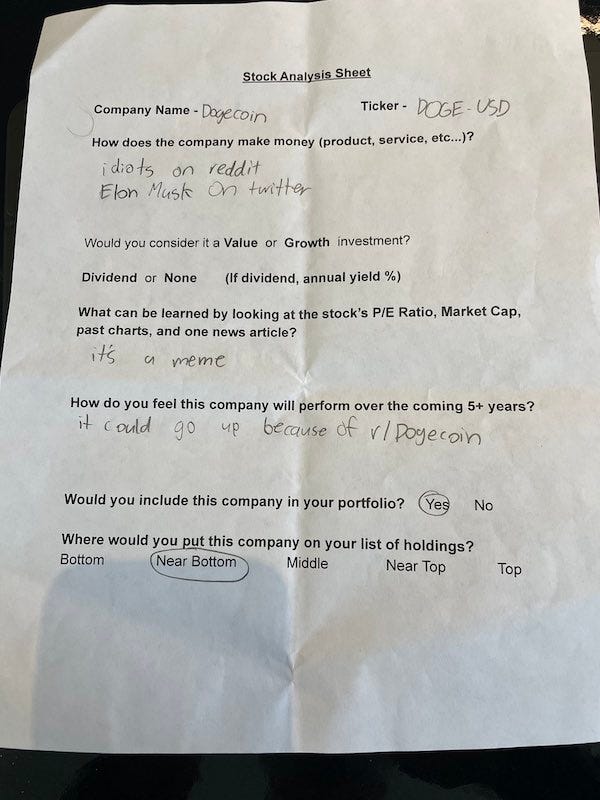Making money comes from how you think.
Some people see daily raging fires and endless problems that can never be solved. Successful people see problems that lead to opportunity. I’ve spent almost eight years studying the second category.
The popular finance book “Money Master The Game” features interviews from investing greats such as Warren Buffett, John Bogle, Paul Tudor Jones, Ray Dalio, and Carl Icahn. By the end of the book, you’re left with one giant takeaway: money is a game that plays in your mind every day. Therefore your financial psychology is far more important than knowing what to invest in.
These are the psychological tricks everyday people can use to make more money.
A multiple customer mindset
Reprogram your brain to see a job as a single customer. A job and one freelancing client equals two customers. When you have multiple customers depositing into your bank account each month, you’re less susceptible to a gust of wind blowing your dreams off a cliff.
Most of my career has been spent having only one customer. It’s lonely. For a guy who used to suffer from extreme mental illness, getting paid by one customer was a daily nightmare.
A meeting at 4 pm on a Friday feels like a potential layoff. A stray order from a boss that turns into chaos feels like not being able to pay rent. When we think about starting a business, it’s often overwhelming because we imagine it requires hundreds of customers. What if there’s a half-way point? There is.
Change your mindset from working for one customer, to working for two customers. Once you’ve got two customers, it’s easy to add more.
Volatility equals growth
Bitcoin critics make me laugh. They point to the extreme ups and downs in price and say “that’s why it’s bad.” You can’t have stable prices and high growth — it’s an oxymoron. Give me 200% year-on-year growth in return for price swings, every day of the week.
You have to take some risks to make more money. A life of no risk equals a life of no growth.
The psychological trick is to choose volatility in price for a small percentage of your investments. The money you make from high-growth investments like Bitcoin can offset the lower returns of your other investments. A 1% investment in Bitcoin can raise your entire investment portfolio by a total of 20%. Most people’s psychology can deal with a 1% loss.
In personal finance, we overvalue math and undervalue psychology — Ramit Sethi
“You can be twice as rich by deciding you need half as much”
The founder of Gumroad, Sahil Lavingia, is famous for coming up with cool psychological tricks like this one.
Our minds tell us subtly every day that we need more, more, more. A huge trick when it comes to money is to dial back your consumer brain. Decide you don’t need to make as many purchases.
Financial freedom can come from investing. Financial freedom can come from halving how much money you spend. Combine both and you’d be pretty unlucky *not* to do extremely well financially.
I met a guy yesterday who’s a school teacher. He quit teaching last year and now spends his day exploring art from hundreds of years ago and writing short tweets. On the Zoom call, he wore modest clothes and lived in an average house with his two children. I later found out he was worth tens of millions of dollars. I asked him, “How’d you do it? What’s the secret?”
“Spend half what everybody else does and don’t worry about people’s opinions of what you own.”
The money he saved went into an index fund that tracks the Nasdaq (high growth tech stocks) with 3 x leverage. As you can imagine, tech stocks have done well over the last decade.
Program your brain to spend half as much.
Switch off the noise
There’s a lot of noise when it comes to making money. If you’ve done well, people want to talk you out of your financial plan. If you’ve done poorly with money, then people want to sell you the latest snake oil. Some people even run to hills and scream “XYZ investment is dead.”
Snoozefest.
Turning off the noise is crucial. Choose a few personal finance experts to read and switch off all the pretenders — especially those who have no background in finance, as these people are literally guessing and it makes their ego feel good to drag you down with them.
A disciplined mind that can shut off the noise is a superpower.
View money as time
We’re programmed from childhood to see money as a way to buy stuff. The number one psychological trick that’s changed my life is to see money as time, so you can do more of what you like doing.
Financial freedom is having time, not a Lambo.
Become a subscription tightass
Subscriptions take money from us for things we don’t use as much as we may think. A subscription assumes you’re going to be a power user. The truth is most of us don’t maximize our current subscriptions.
Subscriptions are nice to have. Subscriptions trick us into thinking we’re solving a problem. Are we really? Nope.
I keep a tracker in my phone of every subscription I have. A monthly cull is necessary because software subscriptions are damn hard to avoid signing up for. The promise of more time is more tempting than a 1-liter tub of gelato.
Don’t let superficial benefits allow your subscriptions to become bloated.
Hone your psychology to notice B.S.
Our minds are great at rationalizing an investment. But we lie to ourselves about money without even realizing it. Dogecoin is a cryptocurrency like Bitcoin without the good stuff and is an example of an asset class that fools many people’s minds. Here’s some simplistic analysis of Dogecoin from a high school kid, as proof of how our minds lie to us.

When you write down the features of Dogecoin, it’s pretty obvious what it is and why you shouldn’t throw thousands of dollars into it.
The easiest way to trick the mind is to do the research, analyze the findings, read back the results, and show them to people you trust for feedback. When you do, you’ll find a reason to stay away from investments that are psychological tricks designed to steal money out of your wallet and give it to the nearest Joe Schmo wearing a rainbow hat with a propeller on top.
Think long-term, not short-term
Many content creators want to make more money. The problem is they don’t understand the power of long-term thinking. I’ve learned that publishing content for 5 years straight can completely change your financial position.
The challenge is most content creators become impatient at the 3–6 month mark. So they give up and miss out on all the gains. If they knew that 5 years could make their content creator goals a reality, they might keep going.
The thing is no financial success is guaranteed. But you can certainly look at people who have the same goal and work out the odds. When I did the experiment, it became clear that my favorite content creators all shared the 5-year plan.
The same is true with investing in blockchain projects. Many people ask me about the day-to-day swings in price. I couldn’t give a stuff. The price today is meaningless. What matters is the price in 5–10 years.
The last 13 years have already shown us what’s possible with blockchain. Thinking about making money in the short term from investing is the product of gambling, casinos, and the lottery. There is no such thing as a quick win when it comes to money.
Real money is made over 5–10 year time periods.
Boring hobbies make money
Hobbies used to be a way to enjoy ourselves. That hasn’t changed. What’s changed is that the creator economy has allowed us to make content about a hobby and earn money from it.
- Quora pays content creators.
- Substack pays content creators.
- Bitclout pays content creators.
- Youtube has paid content creators for years.
- Facebook now pays content creators.
- Twitter now pays content creators.
- NewsBreak used to pay content creators before they pushed the self-destruct button.
- LinkedIn is thinking about paying content creators.
If you own a phone then you can join the creator economy. It may not replace the salary from a job, but it can certainly make you side hustle money.
Psychological trick: there is money everywhere when you become a content creator and document what you love.
Bringing It All Together
How you think about money is just as important as learning how to make money. Don’t underestimate faulty beliefs or closed-mindedness, as both can destroy your finances.
You quietly make money when you become aware of how you think about money. The people who make more money adopt the financial psychology of the best investors: patience, deep thinking, a willingness to take calculated risks, an open mind, and placing money into multiple assets.
You only live once. Use money to buy back your time.
This article is for informational purposes only, it should not be considered Financial or Legal Advice. Consult a financial professional before making any major financial decisions.


